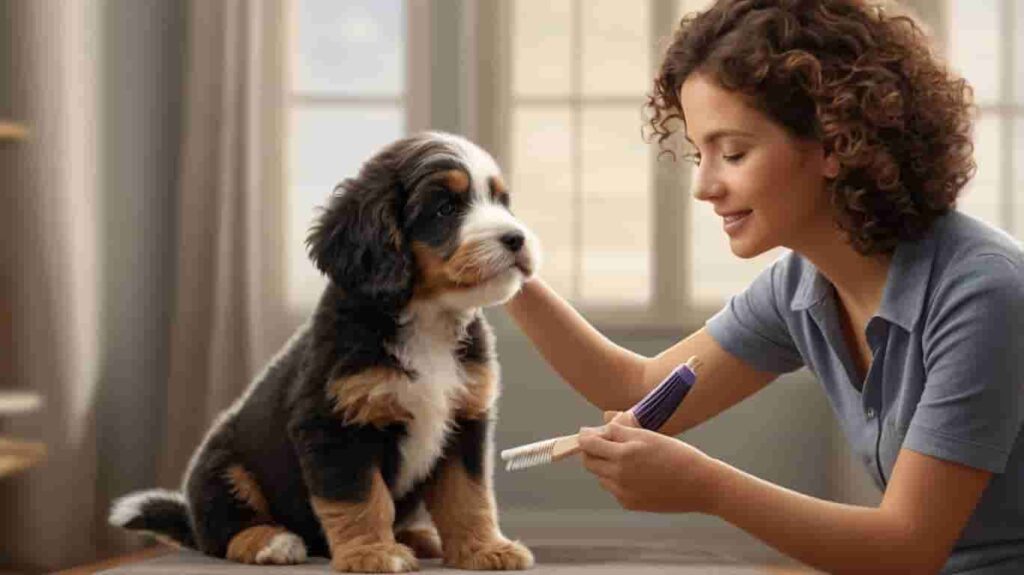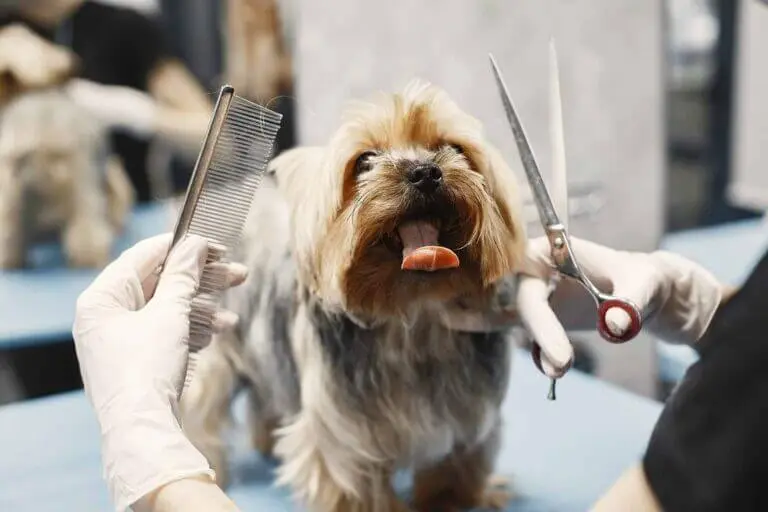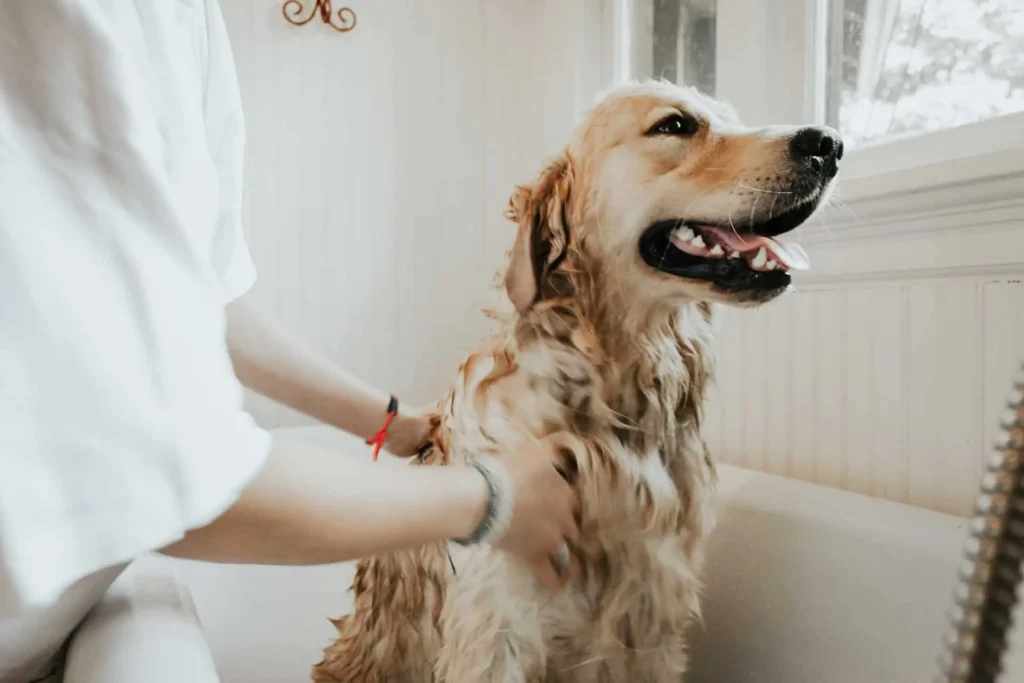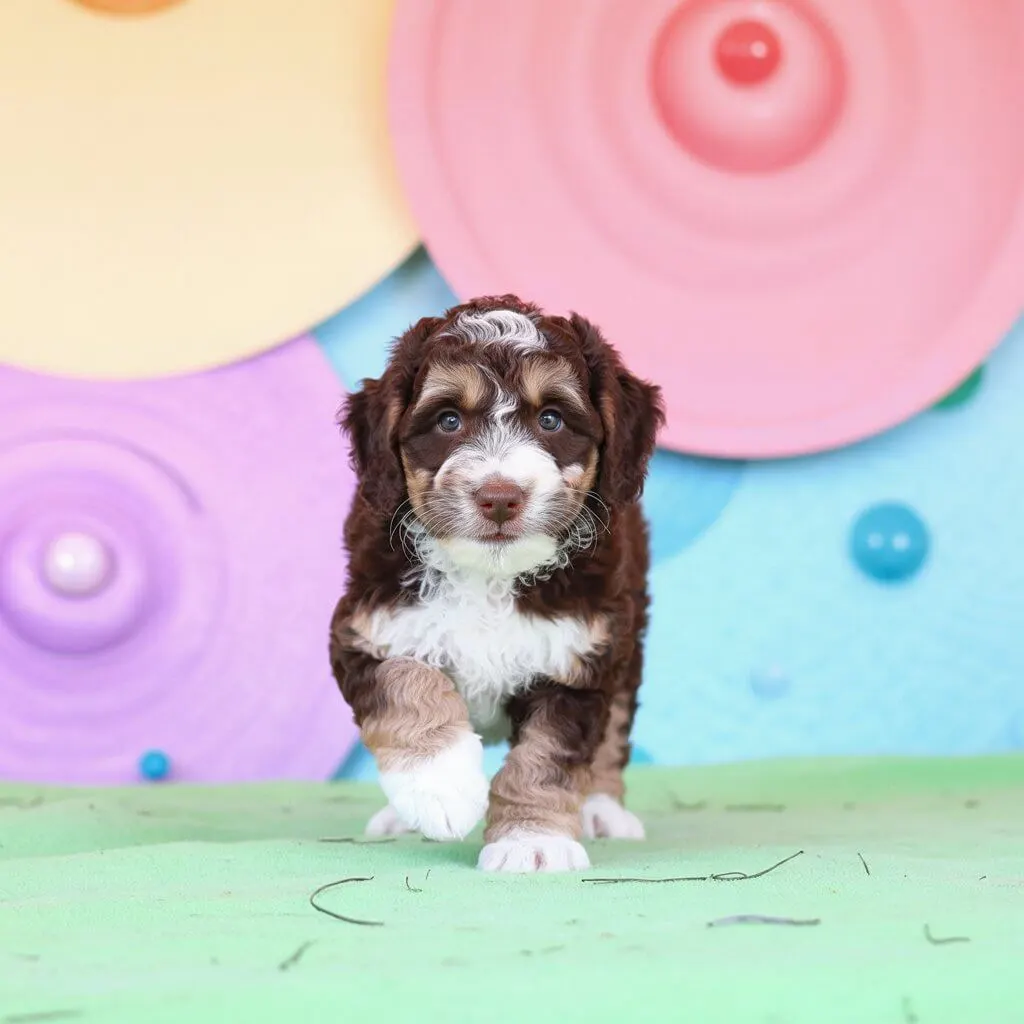How to Care for A Bernedoodle Puppy
Feeding, Socialization, and First-Year Tips
The Bernedoodle, a charming cross between the Bernese Mountain Dog and the Poodle, is known for its friendly demeanor, intelligence, and hypoallergenic coat. However, as with any puppy, proper care during their first year is essential to ensuring they grow into healthy, well-behaved adult dogs. In this guide, we’ll cover the most important aspects of caring for your Bernedoodle puppy—feeding, socialization, and essential first-year tips—to help you raise a happy and well-adjusted companion.
1. feeding Your Bernedoodle Puppy
Proper nutrition is the cornerstone of your Bernedoodle puppy’s growth and development. Bernedoodle puppies, like all growing dogs, require high-quality food that supports their energy needs, promotes healthy growth, and helps prevent common health issues.

Choosing the Right Food
Puppy-Specific Formula:
Select a high-quality puppy food formulated specifically for growing dogs. Puppy foods are richer in nutrients and calories, supporting their development during the critical first year.
Size-appropriate Diet:
Since Bernedoodles can range in size from mini to standard, ensure the food you choose matches your puppy’s expected adult size. For example, mini Bernedoodles may require food suited for small breeds, while standard Bernedoodles need food designed for larger breeds.
Protein and Fat:
Look for foods that are high in animal-based proteins (chicken, lamb, beef, or fish) and contain healthy fats for energy. These nutrients are critical for muscle development, coat health, and overall vitality.
Avoid Fillers:
Steer clear of foods with fillers like corn, wheat, or soy. These don’t provide the necessary nutrients for a growing puppy and can cause digestive issues.

Feeding Schedule
- Age 8-12 Weeks: At this stage, your Bernedoodle puppy should be fed three to four times a day. Their small stomachs need frequent meals to maintain their energy levels.
- Age 3-6 Months: Transition to three meals per day as they begin to grow and develop a stronger appetite.
- Age 6-12 Months: By six months, you can begin to feed your puppy two meals a day, which will continue into adulthood.
How Much to Feed
The amount you feed will depend on your Bernedoodle’s size and the brand of food you choose. Generally, a standard Bernedoodle requires around 2-3 cups of food daily, split into two meals. Mini Bernedoodles will require less, often around 1-2 cups per day. Always consult the feeding guidelines on your chosen food packaging, and consult with your veterinarian to tailor a diet plan for your specific puppy.
2. Socializing Your Bernedoodle Puppy
Socialization is a vital part of your Bernedoodle puppy’s development. Early socialization helps your puppy become confident, well-behaved, and comfortable in a variety of situations. A well-socialized Bernedoodle will be a friendly, adaptable, and confident adult dog.
Start Socialization Early
The window for optimal socialization is typically between 8 and 16 weeks of age. During this critical period, your puppy’s brain is highly receptive to new experiences, which means early exposure to different environments, people, and animals can significantly shape their behavior later in life.
- Introduce Your Puppy to New People: Your Bernedoodle should be introduced to a variety of people, including children, adults, and people of different ethnicities and genders. This helps prevent fear or aggression around strangers in the future.
2. Other Dogs and Animals: Socializing your puppy with other dogs, both in controlled environments like puppy classes and at dog parks, will help them learn appropriate play behavior and develop canine social skills.

3. New Environments and Sounds: Take your puppy on car rides, to the park, and to different places so they can experience new sights and sounds. Introduce them to common household noises like vacuum cleaners, doorbells, and the sound of the TV to help them become desensitized to common household stimuli.
Handling Potential Issues
If your Bernedoodle starts to show signs of anxiety or fear during socialization (such as growling, hiding, or biting), try to remain calm and avoid overwhelming them. It’s crucial not to force interactions that make your puppy uncomfortable. Instead, work at your puppy’s pace and use positive reinforcement to reward calm behavior. If problems persist, consult a professional dog trainer who specializes in fear-based behavior.
Training During Socialization
- Positive Reinforcement: Use treats, praise, and toys to reward your Bernedoodle for calm and positive behaviors during socialization. This will help them associate new experiences with positive outcomes.
- Enrolling in Puppy Classes: Puppy training classes are an excellent way to expose your puppy to other dogs while teaching them basic commands such as “sit,” “stay,” “come,” and “leave it.” Early obedience training strengthens the bond between you and your puppy, setting the stage for well-mannered adult behavior.

3. First-Year Tips for Your Bernedoodle Puppy
The first year of your Bernedoodle’s life is an exciting, challenging, and crucial time. As they grow, you’ll need to address their changing needs, ensure they stay healthy, and provide them with the training and attention they deserve.

Crate Training and Potty Training
Crate Training
Introduce your Bernedoodle puppy to a crate early on. Crate training is an excellent way to provide them with a safe and comfortable space while also helping with potty training. It’s important to make the crate a positive place by offering treats, toys, and praise when they enter the crate.
Potty Training
Bernedoodles, like most puppies, need consistency when it comes to potty training. Establish a routine where you take your puppy outside first thing in the morning, after meals, and before bed. Positive reinforcement for going potty outside is key, but avoid punishment if accidents happen—puppies are still learning.
Physical Exercise and Mental Stimulation
Exercise
Bernedoodles are active, intelligent dogs that need regular exercise to stay healthy and avoid boredom. During their first year, they’ll require more frequent, short play sessions and daily walks. As they grow, they’ll need longer walks and more outdoor activities to burn off excess energy.
Mental Stimulation
Engage your Bernedoodle’s mind by introducing puzzle toys, training exercises, and interactive games. Poodles, one of the Bernedoodle’s parent breeds, are known for their high intelligence, so keeping your puppy mentally stimulated is crucial to prevent destructive behaviors.

Health Care and Vet Visits
Vet Visits
Ensure your Bernedoodle puppy receives their first round of vaccinations and regular check-ups throughout their first year. Your vet will also provide advice on parasite control (like flea and tick prevention) and recommend spaying or neutering when the time is right.
Teething
Bernedoodle puppies go through the teething phase around 4 to 6 months of age. This can cause discomfort and a desire to chew. Provide appropriate chew toys to help ease their discomfort and protect your furniture from destructive chewing.

Grooming and Coat Care
Brushing
Bernedoodles have a thick, curly or wavy coat that requires regular grooming to avoid matting. Start brushing your puppy’s coat early to get them accustomed to grooming sessions. Aim to brush your Bernedoodle at least two to three times a week, and use a good quality dog brush to prevent mats.
Bathing and Nail Trimming
Bathing should be done every 4-6 weeks or as needed, especially if your puppy enjoys outdoor adventures. Nail trimming is necessary every 3-4 weeks to keep their paws healthy and prevent overgrowth.
Ear Care
Poodles are known for their floppy ears, and Bernedoodles inherit this trait. Regularly check and clean your puppy’s ears to prevent infections.

Conclusion
Caring for a Bernedoodle puppy in their first year is an incredibly rewarding experience, but it requires patience, consistency, and love. By focusing on their nutrition, socialization, physical and mental exercise, and grooming needs, you can help your Bernedoodle grow into a healthy, happy, and well-behaved adult dog.
Remember, the first year is just the beginning of your journey together. With your guidance, a Bernedoodle can become an affectionate and loyal companion for years to come. We’ve also gathered some fascinating facts about Bernedoodles that you’ll love—get ready to discover what makes these pups truly special!















